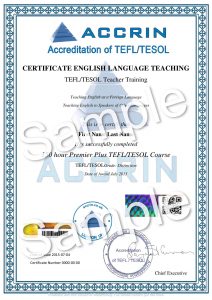What is accreditation?
Accreditation is a term usually associated with academic education. Generally, it refers to whether a given degree or certification program or the institute, college, or university offering such program meets certain defined quality standards for such as competency, authority, credibility, etc. In short, it simply is a review or validation granted to a program or institute upon meeting some minimum criteria.

Basically, accreditation is used for higher education standards. You might have noticed that there is some state-controlled education authority regulating the standard of education in your country. Similarly, these types of state authorities exist in many countries. These academic regulatory boards based on their judgment and tests either assign a ranking list of colleges and universities or they just authorize them to run certain programs.
Importance of English language
Though the English language may have slight differences in pronunciation and spelling based on its geographical origin, it is widely spoken globally for trade and beyond. This international acceptance of the English language attracts many to learn it not only for their day to day communication, but it also increases the demand for using professionally recognized English tutors.
What is TEFL and TESOL?
TEFL and TESOL are two commonly used acronyms that come to mind when you search for ‘how to teach English’ courses. They are often paired together as TEFL/TESOL.
Primarily, TEFL stands for ‘Teaching English as a Foreign Language’, whereas TESOL stands for ‘Teaching English to Speakers of Other Languages’. These abbreviated forms when used in paired form might seem the same thing, but when broken into full meaning, you will know that they are two quite different courses.
TEFL
Teaching English as a Foreign Language (TEFL) are programs meant for teaching English to non-native speakers in a country where English is not a primary language. For example, most countries in Asia such as the United Arab Emirates and China, and almost all of Europe such as Spain and Germany.
The students of TEFL programs study English as a secondary language, attending these courses as part of their academic curriculum just as they learn mathematics, science, history, etc. From a broader perspective, their course guideline will include learning concepts of English grammar, vocabulary, reading, listening and writing comprehension, and speaking.
The main purpose of TEFL programs is to equip its participants with enough knowledge of English that helps them with academic tests as well as to have some basic level understanding to speak among themselves or with a native person.
TESOL
Teaching English to Speakers of Other Languages (TESOL) are programs designed for teaching English to non-native speakers residing in countries where English is spoken as a primary language.
As emphasized above on the global acceptance of English as an international language, many people from non-native countries travel abroad to English speaking nations for their jobs and other purposes. Also, thanks to technology, many people in non-native countries have clients in English speaking countries with which they communicate on a daily basis. TESOL programs are for such persons who plan to teach English to such people who are required to speak English to carry out their day to day activities just as they do it in their primary language.
TEFL/TESOL Accreditation – Why and Where?
Becoming an accredited TEFL/TESOL teacher enhances your chance of getting a better job, your clients trusting you more with their English learning issues. And of course, getting accreditation from a credible source and recognized source like ACCRIN will play a key role in your success on this journey. Visit accrin.co.uk for more information.





